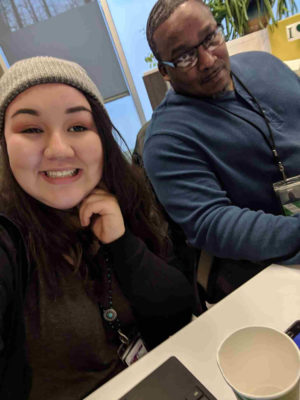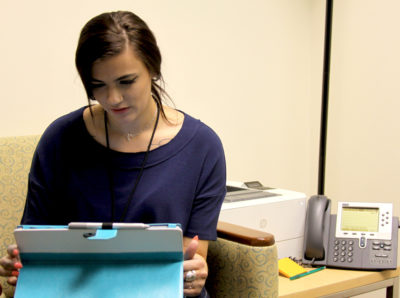In the wake of the Nov. 30 earthquake, a grant from the Rasmuson Foundation was the unexpected hero that kept ANJC from delaying services

When a Rasmuson Foundation grant provided the Alaska Native Justice Center (ANJC) with laptops that would allow staff to work remotely with communities across Alaska, no one was thinking about earthquakes. But thanks to the Laptops for Justice project, within just one week of the November 30 earthquake, ANJC was operating at 80 percent capacity. By December 31, the organization was 100 percent operational.
“Without that grant, we would not have been at 80 percent as soon as we were,” stated Tammy Ashley, ANJC Director of Operations. “Before the Rasmuson grant, I was the only staff person with a laptop. We were blessed to have that grant because it meant that we were able to get up and running and serving our participants within days of the earthquake.”
Disruption of Services

On November 30, 2018, a magnitude 7.0 earthquake shook Anchorage and surrounding communities, causing damage to homes, businesses, and roads.
The Nat’uh Service Center, home to Cook Inlet Tribal Council (CITC) and its subsidiary ANJC, as well as to The CIRI Foundation and Koahnic Broadcast Corporation, experienced severe damage due to the earthquake. On December 2, CITC announced that the closure of the service center would continue; lead staff was already planning for the relocation of CITC service departments.
Meanwhile, six ANJC staff were huddled at two desks in the Qech’henu Transportation Center on the CITC campus.
Two administrative staff, two Re-entry Program staff, and two Advocacy case managers immediately began responding to the earthquake’s aftermath, serving as a crisis team for anyone who came looking for direct services. They contacted ANJC participants to make sure they were safe.
Because they had laptops that allowed them to work from anywhere, they were able to connect to the ANJC database, collaborate with partners, and refer individuals to resources.
“Any disruption of service wasn’t because of an inability to connect online,” Tammy explained. “Our support groups couldn’t meet, but we could do one-on-ones with participants at coffee shops or other safe spaces. Our communication with each other and with participants was enhanced because we were able to work remotely.
“I couldn’t imagine if we didn’t have the laptops made possible by the Rasmuson Foundation,” Tammy added. “Without them, the services provided by our department may have been delayed until after Christmas.”
Continued Support
Instead, by December 8, all ANJC staff were working remotely and had connected with 100 percent of their participants and partners.
Ensuring that services and programs experienced as little disruption as possible was essential, said Tammy.
“For many of the people we serve, the earthquake was a traumatic event on top of other trauma already happening in their lives. Our biggest goal was making sure our participants didn’t have additional disruptions, not just to the plans we made with them, but in their lives. We provided gift cards for those who had emergency needs. For many people, we recommended paying attention to self-care. Many of them don’t realize how added stress can disrupt their success plan.”

“I am positive that our participants were appreciative through the course of our displacement because of our ability to operate professionally under the circumstances,” added Re-entry Case Manager Benny Briggs. “This would not have been possible if we had not had our laptops.”
Continuing services as planned was also helpful for ANJC staff.
“I carried my laptop in a big purse, along with other items, and it became my mobile office,” recalled Nayade Perez, a Reentry Program manager. “I connected with a few participants via email — my main priority was to know they were okay. I can honestly say that as traumatized as I was immediately after the earthquake, working from home on my laptop kept me from thinking about everything else that was happening.”
Today, ANJC staff is back together, operating out of a temporary space at 1835 Bragaw St., Suite 425. Support groups are meeting regularly once more. Thanks to the laptops provided by the Rasmuson Foundation, though, and the ANJC staff’s quick response post-earthquake, services and programs never stopped.
“I am positive that our participants were appreciative through the course of our displacement because of our ability to operate professionally under the circumstances. This would not have been possible if we had not had our laptops.”
“The Foundation is grateful for the work Alaska Native Justice Center staff provides to our community,” said Sharity Sommer, a Foundation program officer who oversaw the grant. “After the earthquake, ANJC exemplified what community is about, helping others during a time of need. We’re delighted to hear the impact a handful of laptops, provided through a Tier 1 grant, have had in aiding ANJC staff to carry out their work.”
“We were fortunate to have the laptops, plus a dedicated team who, while working remotely, were able to continue communication and services to participants. It says a lot of the commitment and perseverance of the ANJC team,” Tammy said.
Information about the temporary relocation of other CITC departments and subsidiaries is available here.
